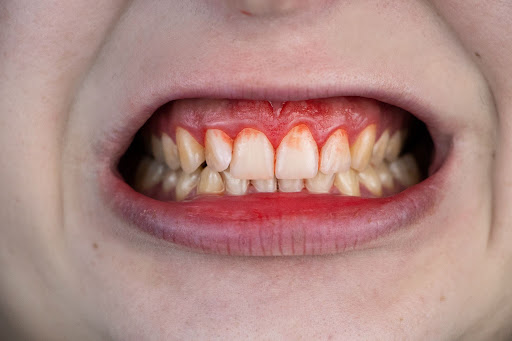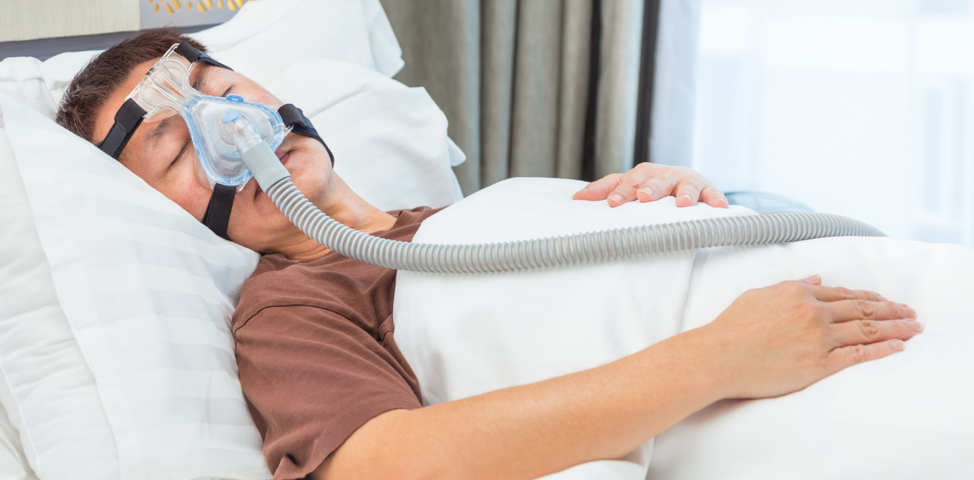
Ask an Atlanta Dentist: Does periodontal disease treatment hurt?
September 17, 2021
Teeth Whitening: How long does it last?
October 8, 2021As if there weren’t enough to keep us up at night, studies show that up to 81 million Americans suffer from Obstructive Sleep Apnea (OSA), a condition that causes the throat muscles to relax and block your airway while sleeping. The relaxing of muscles causes you to start and stop breathing, often waking sufferers repeatedly over a night.
A common treatment for OSA is a Continuous Positive Airway Pressure machine (CPAP). CPAP machines treat sleep apnea by delivering oxygenated air into the patient’s airways using a mask and a tube. This stops the airways from collapsing, allowing you to breathe properly during sleep.
The Problems with CPAP Machines
National studies show that up to half of the patients prescribed a CPAP machine quit using it within a few weeks or months.
CPAP machines are loud, uncomfortable, a pain to travel with, and come with a slew of insurance compliance requirements to get them paid for. While many find them an effective treatment, like anything, they only work if you use them. The good news is that there is a great CPAP alternative known as oral appliance therapy, that has been shown to have equal or better results.
Here are five reasons that patients should consider alternatives to CPAP for Sleep Apnea treatment:
1. Comfort
Sleep should be relaxing and peaceful. For many, the process of hooking up to a machine and donning a mask each night is disruptive. The masks can cause discomfort, anxiety, and claustrophobia during the time when you most need to wind down and be at peace. Devices like an oral appliance are custom fitted to make them comfortable, breathable, and simple to use. They often become so easy to wear, patients report forgetting to take them out in the morning when they get up.
2. No tracking or reporting use
CPAP machines are not cheap, and insurance companies don’t want to pay for something you aren’t using. New technology has enabled CPAP devices to communicate directly to the insurance companies, sending a slew of information including how many days and hours you actually used the device.
If you are not meeting the insurer’s requirements, they may tell you to return the machine or deny the claim to pay for it. For patients trying to learn and adapt to all the changes a CPAP machine brings to their lives, this may cause undue stress and worries, adding to the disruption of the sleep cycle, not to mention the perceived invasion of privacy.
3. Travel made simple
There is enough stress when traveling without having to factor in packing and maintaining a CPAP machine. First, there is the hassle of air travel and navigating the list of TSA, FAA, and airline policies for medical devices. Then, you have to make sure your seat has a plug so you can sleep on long, international flights. Finally, once you arrive at the hotel, you need to plug in and set up a CPAP machine for a night’s use.
Alternatives like an oral appliance can be carried in a case in a pocket, have no restrictions or concerns in flight and are mostly inconspicuous. They turn treating and managing your OSA into a non-factor when considering travel.
4. Options for sleep position
The web is full of articles on which sleeping position is healthiest and what each says about your personality, but the truth for many of us is that changing a sleep position is not as simple as it sounds. While we may start in a recommended sleep position, we roll and move as we drift off. Though many studies recommend side sleeping as a good option for those suffering from OSA, many CPAP users find it difficult to find a comfortable position, especially while wearing a full-face mask. Full masks often become displaced for side sleepers negating the benefits of the CPAP machine.
5. Less disruptions
Partners sharing the same bedroom complain about the noise and the light emitted from an operating CPAP machine. While most partners prioritize the health and well-being of their loved one, none of us wants to disrupt our partner’s sleep, adding one more reason to stop using the CPAP machine. While obviously less invasive to the user, custom oral appliances are silent and simple and won’t disrupt the peace of others in the bedroom either.
Get a Better Night’s Sleep
The use of a CPAP machine should not be something to lose sleep over, especially when there are so many effective alternatives. Make your sleep and overall health and wellness a priority and find a solution that you will use consistently and puts you on the path to the life you deserve to be living. For more information about an alternative to CPAP in Grant Park, call 404.328.7177 or message us online today to schedule an appointment with Dr. Abbey J. Lee.


